- Home
- Bruce, Leo
Furious Old Women Page 2
Furious Old Women Read online
Page 2
“Thank you.”
“When will you start your enquiries?”
“Tomorrow,” said Carolus.
2
CAROLUS drove the forty miles from the village of Gladhurst to the town of Newminster where, in the Queen’s School, he was Senior History Master.
The Queen’s School, Newminster, is, as its pupils find themselves under the necessity rather often of explaining, a public school. A minor, a small, a lesser-known one, they concede, but still in the required category. It has a hundred and sixty day-boys, ninety boarders and a staff of eighteen. Its buildings are old, picturesque and very unhygienic and one of its class-rooms is a show-piece untouched from the Elizabethan Age in which the school was founded.
At the school Carolus occupied an equivocal position. He was an extraordinarily good teacher but as a member of the staff he gave the headmaster, Mr Gorringer, many unquiet hours. His excessively large private income and Bentley Continental motor-car, his habit of dressing rather too well and keeping up an extravagant establishment for himself did not endear him to the staff, who were sparsely paid, conscientious men. His known interest in criminology and the fact that he had solved a number of much-publicized murder mysteries made the headmaster ‘tremble as he put it, for the good name of the school.
Carolus, moreover, had an unfortunately casual manner which Mr Gorringer could not but feel only narrowly missed the disrespectful. Mr Gorringer took his head-mastership seriously and was highly averse to the flippancy of Carolus. He was a large man with a pale solemn face and a magnificent pair of pendulous, hairy ears. His verbose and earnest manner of speech became him.
Carolus was aware that in school the boys were apt to take advantage of his known interest in crime both ancient and modern. A master with a hobby-horse is easily led away from the tiresome lesson in hand into the realms of his fancy. He may or may not realize this as the end of the school period comes and he finds that he has talked for three-quarters of an hour on his favourite subject and forgotten what he was supposed to be teaching.
Carolus Deene was very well aware of his weakness but he regarded his twin interests of crime and history as almost indistinguishable. The history of men is the history of their crimes, he said. Crippen and Richard III, Nero and the latest murderer to be given headlines in newspapers were all one to him, as his pupils delightedly discovered. However Carolus enjoyed his job of teaching history and was conscientious over his work.
As he reached Newminster he realized that it was nearly nine o’clock and expected no mercy from his housekeeper Mrs Stick. The dinner she had cooked for him would be spoilt and her temper with it. If in addition she suspected that his lateness was caused by anything connected with criminal investigation she would be nearly as angry as Mrs Bobbin.
“Fortunately it was chops,” she said breathing hard when Carolus was seated. She was a small, thin severe woman who cooked superbly and with her husband made Carolus’s home the most comfortable in Newminster.
“That’s all right then,” said Carolus brightly.
“It’s a good thing I didn’t put them on,” said Mrs Stick. “Nor the soufflay either. Else they’d have been ruined. It’s nine o’clock.”
“Is it really? Time goes by when you’re interested, doesn’t it?”
This earned him a long suspicious stare from Mrs Stick.
“I don’t know what you’ve got to be interested in, I’m sure,” she said. “It wasn’t anything to do with the school because Stick heard tonight from the school porter that you were Missed at the house match this afternoon. The headmaster was enquiring for you afterwards.”
“Oh dear, was there a house match?”
“Yes, Sir, there was, and you wasn’t at it so when you say you’ve been interested you can’t blame me if I think the worst.”
Carolus said nothing while Mrs Stick was bringing in his grilled chops.
“All my nice saltay potatoes have gone dead and greasy, of course. Well, you can’t expect anything else. I was only saying to Stick that I don’t mind as long as it doesn’t mean you’re thinking of starting anything of that kind again. We can’t have murderers and such all over the house.”
“Surely we never have?”
“Well, coming here at all hours and us not knowing whether you’d ever come back alive each time you go out. Look at that time they tried to poison you! And how our holiday was upset that year when they kept finding bodies.”
“The chops are excellent, Mrs Stick.”
“So they may be. But I was saying to Stick today I shan’t be cooking for Mr Deene much longer if he gets up to any more of these larks with murderers. It will never do, I said. People will begin to think there’s something funny about us next.”
“And what did Stick say?” asked Carolus curiously, for in all the years he had been hearing of Mrs Stick’s remarks to her husband he had never once been supplied with the reply.
“Stick says what I say,” said Mrs Stick vehemently, and Carolus did not doubt it.
“I don’t think there’s much fear of your being involved this time, Mrs Stick.”
“Then you are up to something,” said the little woman triumphantly. “I knew it as soon as you came in late like that. Not that poor lady battered to death over at Gladhurst, is it?”
“You wouldn’t want to see an elderly woman murdered and the murderer go unpunished, would you?”
“There’s police to see to that and no call for you to start upsetting us all. It’s no good, Sir. Stick and I will have to leave and go somewhere where we don’t have the horrors every day of our lives. Put into an open grave, wasn’t she? Look at that and tell me how I’m expected to sleep sound at night. Besides, there’s what my sister will say. Last time I saw her she was on about my working where there are all these murders. I don’t know. I really don’t.”
But Carolus had an even more difficult interview next morning when Mr Gorringer the headmaster sent for him during the Break.
Carolus was speeding towards the common-room in order to seize The Times before Hollingbourne could despoil the virginity of its crossword puzzle with the two clues he usually managed to solve, when he was waylaid by Muggeridge, the school porter.
“He wants you,” said Muggeridge sulkily, not needing to enlarge on this.
“Damn,” said Carolus.
“I know. That’s what I said when he rang that blasted bell of his.” Muggeridge found his life a wearisome one and resented the uniform, including a gold-braided top-hat, on which Mr Gorringer insisted. “He could just as well have come and spoken to you himself. But no, he has to sit at his blasted desk and ring his blasted bell and send me chasing all over the blasted place looking for you while my tea’s getting cold. He’s got something up his sleeve, too.”
“Thank you, Muggeridge.”
“Oh, I don’t blame you,” conceded Muggeridge. “You can’t help it any more than what I can if he wants to get on his high horse. I shall tell him, one of these days.”
Carolus found Mr Gorringer if not on his high horse at least very upright and pontifical as he sat at his enormous study table.
“Ah, Deene,” he greeted Carolus in a manner neither over-friendly nor hostile. It was hard to guess what direction the interview would take. “I wanted a word with you.”
Carolus nodded.
“Pray take a seat,” said Mr Gorringer. “We were disappointed not to see you at the house match yesterday. A very creditable show on the part of Plantagenet.” The houses at the Queen’s School, Newminster, apart from School House, were known as Plantagenet and Stuart. “But doubtless you had more pressing matters to attend to?”
“Yes,” said Carolus.
“It is in some way connected with this that I wished to see you. I cannot help feeling, my dear Deene, that, while you carry out your duties as Senior History Master with conspicuous care and success, your interest in what we might call the life of the school is apt to wander into regions remote from ours. I recognize your right
to occupy your own time as you wish but it has come to my ears that the other men are a trifle hurt by your indifference to our extra-academic activities.”
Carolus waited.
“It happens, though, that a situation has arisen which will solve this little difficulty in a way most satisfactory to us all. Breadman has decided to retire.”
For a moment Carolus did not catch the awful implications of these last five words.
“As you know, he has been at the school as boy and master since the turn of the century and his going will leave a gap difficult indeed to fill. It will also mean that Plantagenet House will require a housemaster. You, Deene, are Breadman’s successor by right of seniority and I have decided to appoint you.”
Carolus gasped.
“You will have the care of twenty-five boys together with their boarding fees which after due allowance for generous catering leave a very satisfactory balance to your benefit. You will thus, I hope, be drawn into the integral life of the school. Allow me to be the first to congratulate you on this promotion.”
“But headmaster, you can’t possibly be serious,” said Carolus. “As a widower …”
“I have considered that. While it is admittedly desirable that our housemasters should be married men, I have decided not to allow this to bar your way. A good housekeeper can surely be found.”
“But it’s quite outside my scope. I know nothing about catering. I couldn’t think of accepting the responsibility.”
“Come, come, Deene. You are too modest. You will find that once ensconced in Plantagenet you will be absorbed by the small problems it will produce.”
“No!” said Carolus desperately. “Let me make it clear at once, headmaster. I appreciate your confidence in me but I decline absolutely.”
Mr Gorringer eyed him with severity.
“Surely I am not to understand, Deene, that your personal, perhaps I may be permitted to say selfish, interests stand in the way? Your unfortunate hobby, for instance? If I thought that …”
Carolus had a sudden inspiration.
“What about Hollingbourne?” he asked. “He’s a family man. Catering for twenty-five more beyond his own children would be child’s play to him. He’d like it.”
“Hollingbourne is your junior on the staff,” said Mr Gorringer dubiously.
Carolus followed up his advantage.
“Does that really matter? It’s right up his street. I couldn’t possibly deprive him of it.”
“I should like to say that is generous of you, Deene. But I fear me that it is far otherwise. However, Hollingbourne certainly would be gratified by the opportunity. I shall have to consider it.”
Carolus found perspiration on his forehead when he left the headmaster’s study.
But it was a half holiday and though a bitterly cold day the air was crisp and clean. Carolus decided to drive over to Gladhurst immediately after lunch.
He found the case as put to him by the irate old lady Mrs Bobbin was an unusually intriguing one. There had been a marked inconsistency in her account of it to Carolus yesterday, which he had noted at the time and now reconsidered. While insisting more than once that her sister had met her death at the hands of hooligans whose motive was robbery, she had said twice that he would find it a ‘parish’ affair and had spoken of the various persons connected with the parish whom he would meet. It was difficult to know what the old lady really believed.
He had read the newspaper account of the inquest and found that this, like everything else connected with the thing, was inconclusive. The injuries to the skull from which Millicent Griggs had died could have been caused by her being struck from behind with something like a club or could be the result of her head striking something immovable with sufficient force. There was almost no indication of the time of death but the body had been covered for at least ten hours when it was found by Rumble in the morning. No weapon had been found and nothing to indicate where Millicent Griggs had met her death. Nobody strange to the village had been observed that afternoon. Nothing had been traced of the jewellery Millicent Griggs had worn nor the money she was carrying.
So the horizon was clear. Not only was there no hint of the murderer’s identity—it could not even be guessed whether there had been one or two or even more concerned in the crime. The time of it was unknown, so was the place. The way in which the woman was killed, the weapon, all the information which an investigator usually had at the outset was totally lacking. The only thing on which there seemed to be agreement was motive, but here Carolus found himself highly sceptical of the general conclusion, that Millicent Griggs had been murdered for the jewels and money she carried. It could be but it seemed a trite and unlikely solution.
Yet this did not mean that the case would prove to be extraordinarily baffling. It might even be better to start in such uncertainty. Facts would come with time.
He stopped at a point about a mile from Gladhurst from which the little village could be seen nestling—there was no other word—in its wooded valley. The clear winter afternoon gave its outlines sharpness, the square-towered church, the red roofs, the smoke curling upward. It looked compact as though its houses were huddling together to keep warm. It looked friendly, too, a Christmas card village in which one would have supposed there lived only jovial farmers and their amiable workers, kindly cosy people with no enmity or cruelty among them. Well, he had known scenes like that before and seen the outwardly cheery people he met turn into malicious, jealous and violent brutes before his eyes.
For one moment he hesitated. He had a strange superstitious feeling that ahead of him lay great evil and perhaps danger, that the death of Millicent Griggs, horrible though it was, would prove to be only a part of something more menacing and beastly, and that he would find the worst qualities in those he had to meet. Why should he once again walk into the slime when there was so much goodness and kindliness to be found?
But of course he drove on. Curiosity, if nothing more, was sufficient temptation. Why had Millicent Griggs died? Why above all had she been buried in that open grave when the murderer could have escaped at once? Where was she murdered? These were questions enough for the moment without even considering the foremost and final one—who had killed her?
3
THE first person he interviewed in Gladhurst confirmed his feeling of vague repugnance at the case, for he realized almost at once that Naomi Chester was a very frightened young woman. Carolus hated to see fear in any human being, it was to him as embarrassing as nudity. Naomi did her best to conceal what she felt but unsuccessfully.
She was a thin tall girl, a trifle sallow and anaemic-looking yet rather pretty in a thoughtful way. She looked as though she could get and keep anything she wanted by merely clinging to it. She sat opposite Carolus and moved her thin arms and long fingers as though she were about to play cats’ cradles with them. Her brown eyes were watchfully, indeed fearfully, on Carolus.
“How did you get on with the late Miss Griggs?” asked Carolus in a friendly reassuring voice.
“Oh, all right,” said Naomi at once.
Lie One, thought Carolus, remembering what Mrs Bobbin had told him.
“You liked her?”
“Well, I wasn’t much gone on all that church business,” said Naomi.
“Did she talk to you much about that?”
“No. Not about that, she didn’t.”
“Other things, perhaps?”
“I never had much to do with her,” said Naomi sulkily.
The conviction was growing on Carolus that Naomi was not only frightened but had something to conceal.
“She didn’t want to know a lot about your private life?”
Naomi gave a small bitter smile.
“You haven’t any private life in a place like Glad-hurst,” she said. “Everyone knows your business.”
“But not everyone discusses it in front of you. Did Miss Griggs?”
“No!” said Naomi loudly and twined her fingers.
“
Coming to the Thursday of her death. What time did you get here in the morning?”
“Nine. As usual.”
“And leave?”
“I’ve gone over all this with the police. About half-past three.”
“Was that your usual time?”
“I hadn’t got one, really.”
“I understand you normally left at about two-thirty.”
Naomi was growing perceptibly more uncomfortable.
“When I can I do. It’s often later.”
“And that day it was later?”
“A bit, yes.”
“Why?”
“I don’t know.”
“Why?”
“No reason. I just hadn’t finished my work.”
“Surely you’d washed up the lunch things?”
“Yes. Before Miss Flora left.”
“Then what kept you?”
“Nothing. I was just running about finishing.”
“Were you talking to Miss Griggs?”
“No. She was resting.”
“Where?”
“Where she usually rested. In the drawing-room.”
“You didn’t go in there?”
“No.”
“I should like to clear this up, you know. I know enough about housework to know that you’d have got all your rooms done in the morning so that after you’d washed up and put things away and just done the last oddments you could get off. You must have finished the washing-up at half-past two because Miss Flora caught the 2.40 bus. What did you do for another hour?”
“I don’t know now. I was busy.”
“Where?”
“Nowhere special. There were things to be done.”
Carolus decided to use one of his diversions which so often brought out the truth.
“The drawing-room where Miss Griggs was resting is on the ground floor, isn’t it? It has French windows?”

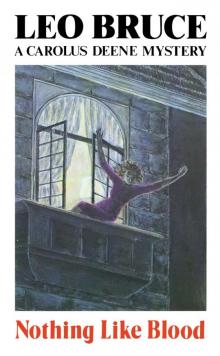 Nothing Like Blood
Nothing Like Blood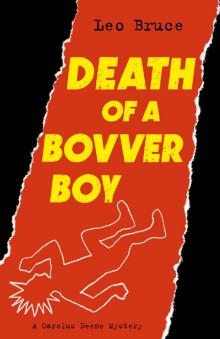 Death of a Bovver Boy
Death of a Bovver Boy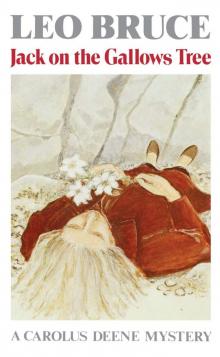 Jack on the Gallows Tree
Jack on the Gallows Tree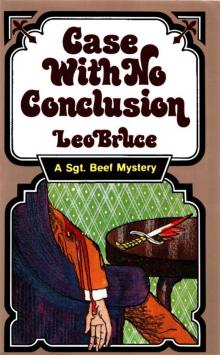 Case with No Conclusion
Case with No Conclusion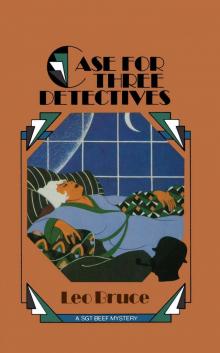 Case for Three Detectives
Case for Three Detectives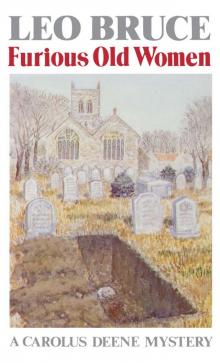 Furious Old Women
Furious Old Women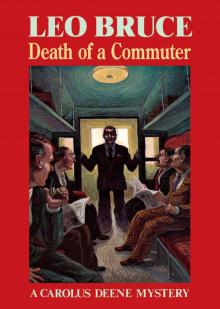 Death of a Commuter
Death of a Commuter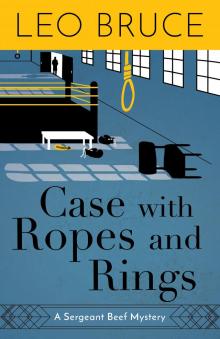 Case with Ropes and Rings
Case with Ropes and Rings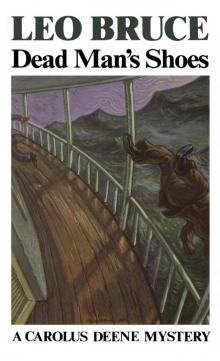 Dead Man’s Shoes
Dead Man’s Shoes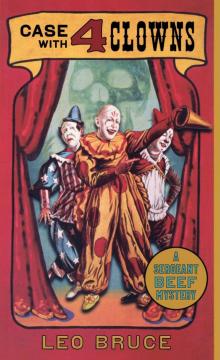 Case with 4 Clowns
Case with 4 Clowns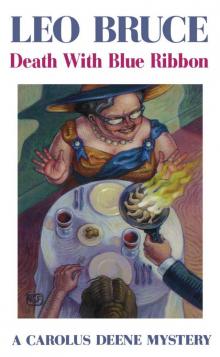 Death with Blue Ribbon
Death with Blue Ribbon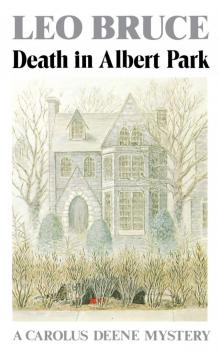 Death in Albert Park
Death in Albert Park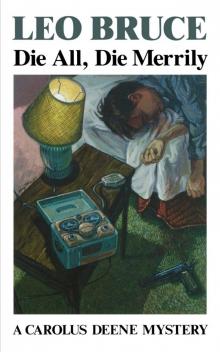 Die All, Die Merrily
Die All, Die Merrily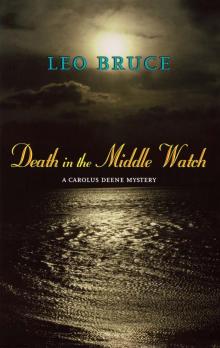 Death in the Middle Watch
Death in the Middle Watch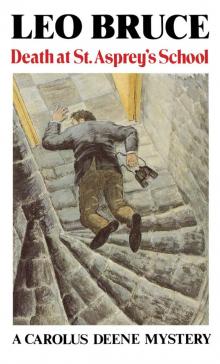 Death at St. Asprey’s School
Death at St. Asprey’s School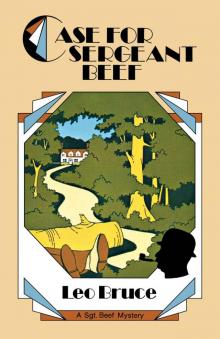 Case for Sergeant Beef
Case for Sergeant Beef